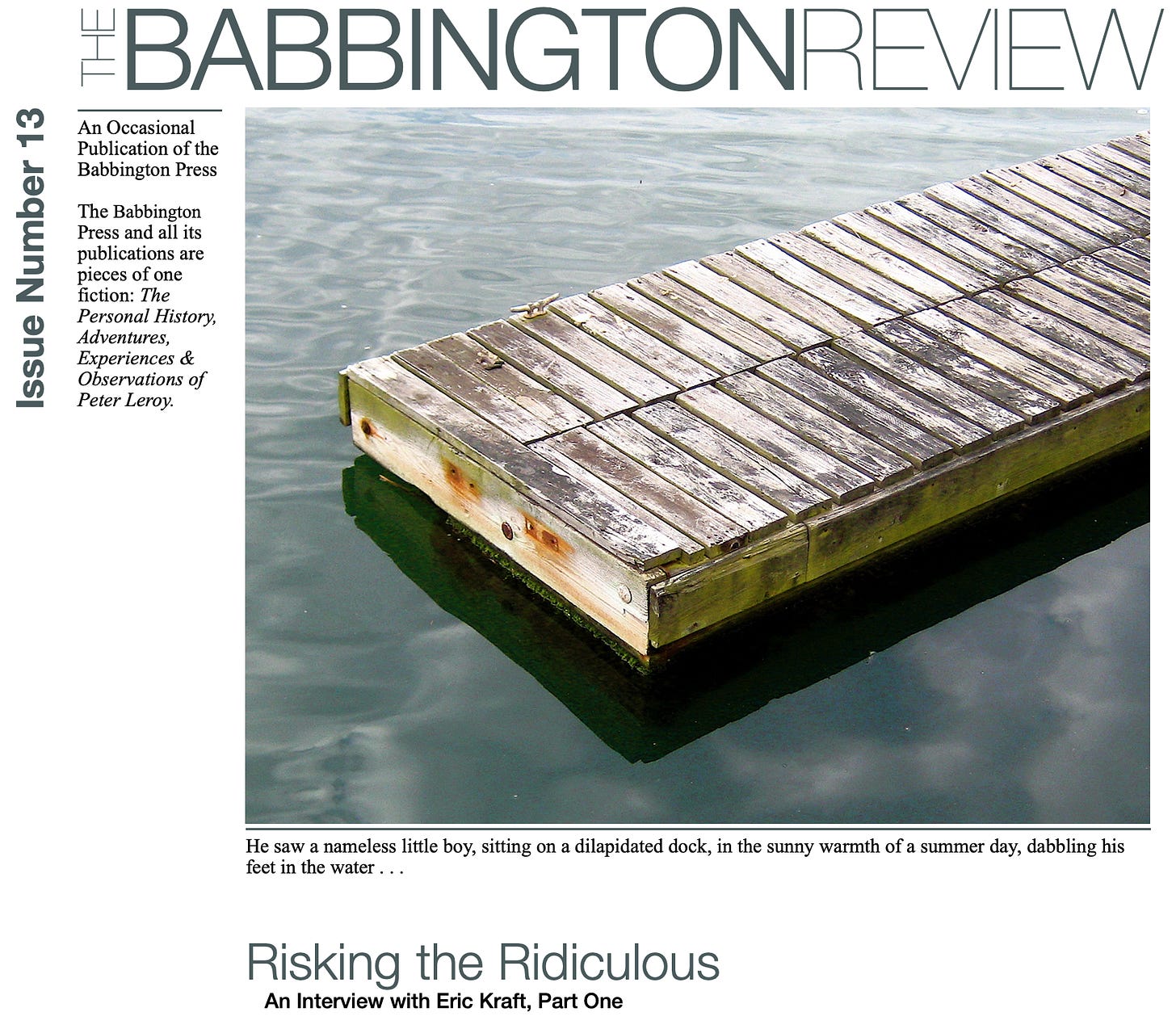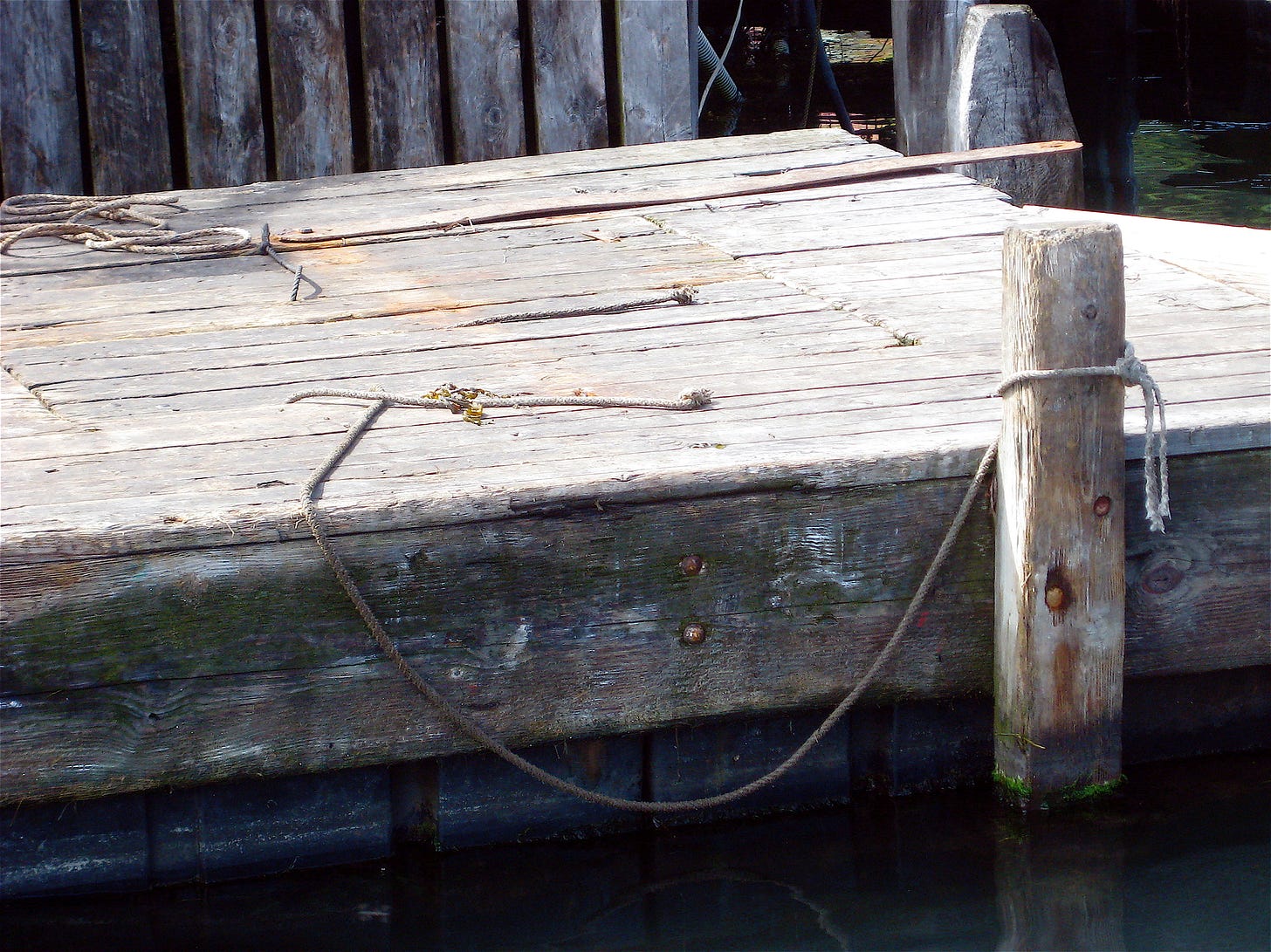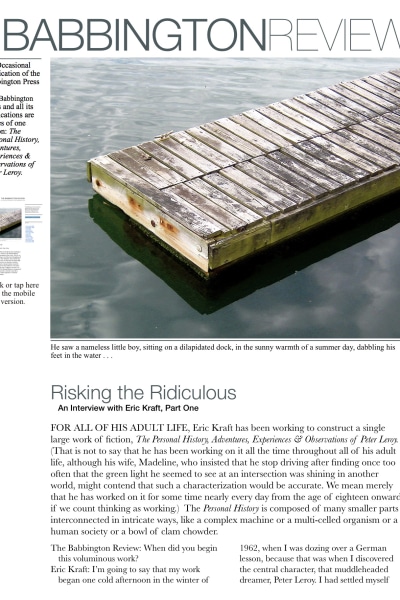FOR ALL OF HIS ADULT LIFE, Eric Kraft has been working to construct a single large work of fiction, The Personal History, Adventures, Experiences & Observations of Peter Leroy. (That is not to say that he has been working on it all the time throughout all of his adult life, although his wife, Madeline, who insisted that he stop driving after finding once too often that the green light he seemed to see at an intersection was shining in another world, might contend that such a characterization would be accurate. We mean merely that he has worked on it for some time nearly every day from the age of eighteen onward, if we count thinking as working.) The Personal History is composed of many smaller parts interconnected in intricate ways, like a complex machine or a multi-celled organism or a human society or a bowl of clam chowder.
The Babbington Review: When did you begin this voluminous work?
Eric Kraft: I’m going to say that my work began one cold afternoon in the winter of 1962, when I was dozing over a German lesson, because that was when I discovered the central character, that muddleheaded dreamer, Peter Leroy. I had settled myself comfortably at a large table on the first floor of Lamont Library, and—
TBR: Lamont Library at Harvard?
EK: Yes, at Harvard. I had settled myself—
TBR: You were an undergraduate?
EK: Yes. I was a sophomore. so—there I was, on that cold afternoon, settled comfortably at a large table. My feet were up; my chair was tilted back; the room was warm, overheated; I was tired. I dozed. When I woke up, I was lying on the floor.
TBR: Lying on the floor? Why was that?
EK: The chair had tipped over. My feet were up. [demonstrates] While I was asleep, I must have shifted on the tipped chair so that the center of gravity shifted, and over I went.
TBR: Not an auspicious beginning.
EK: Well, I didn’t know that it was the beginning of anything, so I didn’t think of it as inauspicious—I just thought it was embarrassing. There I was—flat on my back—or there we were—
TBR: “We”?
EK: The chair and I—both of us—flat on our backs. My books were scattered around me, people were laughing, and I was embarrassed. I gathered my things and rushed out of the library. Outside, in the cold air, the memory of a dream returned to me, something I had dreamt while I was dozing. In the dream, or at least in the memory of it, I saw a nameless little boy, sitting on a dilapidated dock, in the sunny warmth of a summer day, dabbling his feet in the water. He was playing a game. He was trying to bring the soles of his bare feet as close as he could to the surface of the water without touching it. The memory of that dream has never left me, and it continues to surprise me.
TBR: That’s the origin story?
EK: It is.
TBR: Is it true?
EK: Well—
TBR: I’m asking because it sounds rehearsed.
EK: Well, I’ve told that little story about falling asleep in the library many times—so many times over so many years that I no longer know exactly which parts of it are true. I think that all the details are true, but I also think that in fact they were widely separated in time and unrelated. Over the years, I’ve brought them closer together to make a story, improving their relationship without really altering the truth of any one of them, although I have certainly altered the truth of the totality of them.
TBR: That sounds rehearsed, too, by the way.
EK: It is. It’s rehearsed. It’s my origin story, and I’ve told it many times. Didn’t you catch the theme?
TBR: Lying?
EK: Let’s call it the impulse to improve on the past. It’s an impulse that’s always been with me and it’s one of the traits that I’ve given to the character who grew from the little boy on the dilapidated dock—
TBR: —Peter Leroy—
EK: —who became—
TBR: —the character at the center of all your work, and the narrator of most of it.
EK: Yes.
[a pause]
TBR: And?
EK: I was pausing for effect.
TBR: Oh.
EK: Years passed.
TBR: I get it.
EK: From time to time the memory of the dream returned to me, and from time to time the dream itself returned.
TBR: It became an obsession.
EK: No—it wasn’t an obsession—not then. It may be now, but it wasn’t then. It was just a pleasant amusement, a diversion, a vacation from whatever I was working on, thinking about, or worrying about. I could drift into that dream and play with it—and in playing with it, exploring it, I began improving it.
TBR: Yielding to that impulse of yours.
ELK: Exactly. I added a context for the boy—an island, where the dock was, an abandoned building on the island—a grand house or an abandoned hotel—I wasn’t sure which—a gray bay, and the mainland, the town of Babbington. I wrote none of this down.
TBR: Sounds rehearsed again. I mean, “I wrote none of this down.”
EK: Okay. I’ve explained that.
TBR: Right.
EK: Shall I continue?
TBR: Of course. That’s why you’re here.
EK: Right. That’s why I’m here. Well—what I was doing at that time wasn’t writing—not yet. I had no intention or expectation of making a piece of writing out of my explorations. I was daydreaming. Soon, however—
TBR: That sounds like the beginning of a lengthy bit. Do you mind if we take a short break here?
EK: No. Of course not.
[time passes]

TBR: We’re back. Do you want to pick it up at “Soon, however—“?
EK: Sure. [clears throat] Soon, however, like most people who read books, I began to want to write one of my own. Like most people who want to write books, I really wanted to write a book about myself. I tried, but I couldn’t do it.
TBR: You couldn’t do it?
EK: I couldn’t do it.
TBR: At all?
EK: Oh, I did something—but I didn’t make anything worth keeping.
TBR: What was the problem? I mean—a hell of a lot of people seem to find it easy to write about themselves—ad nauseam.
EK: I my case, the problem was that I was too close to my subject. My feelings toward my protagonist were ambiguous. I wanted him to be something better than he was, but I wished that he could learn to live more comfortably with himself as he was, and I wished that he could learn to laugh at himself now and then.
TBR: True of most of us, I suppose.
EK: If we’re being honest with ourselves.
TBR: Are we ever—really—truly?
EK: An interesting question. [pauses] So—I began wanting to trip him up, play practical jokes on him, deflate him. In anything I tried to write, I seemed—more and more often—to be about to make the man on the page take a pratfall, and since he was me I didn’t want him falling down in any book I wrote about him.
TBR: Look—I have to be somewhere in half an hour. Can you bring this to a good stopping point—for this installment?
EK: I can. I can even give you a cliffhanger.
TBR: Knock yourself out.
EK: In 1969 or 1970—a miracle occurred. I found another protagonist, and with that other protagonist, I found my life’s work.
TBR: You’re talking about—
EK: —that little boy who had been sitting on a dock in a dream.
TBR: And with that, you were off and running.
EK: Not quite. I didn’t just jump in and start writing Peter Leroy’s personal history. No. What I began with was nothing like what the work has become—but it was a beginning. I began writing about that dream. I was still trying to write about myself, of course, but as I explored the dream I began the process that would eventually push me out of the story.
TBR: Okay. Let’s stop there for now.
“Everything, mon cher enfant, can be both sublime and ridiculous at the same time.”
Prince Nikolai Sokolsky to Arkady Dolgoruky in Fyodor Dostoevsky’s The Adolescent (translated by Andrew R. MacAndrew)
“Is it not superfluous to write more than one novel if the writer has not become, say, a new man? Obviously, all the novels of an author not infrequently belong together and are to a certain degree only one novel.”
Friedrich Schlegel, Aphorisms from the Lyceum (translated by Ernst Behler and Roman Struc)
He had been making conjectures about his own history, as he had often made stories about Pericles or Columbus, just to fill up the blanks before they became famous. Only there came back certain facts which had an obstinate reality,—almost like the fragments of a bridge, telling you unmistakably how the arches lay.
George Eliot, Daniel Deronda
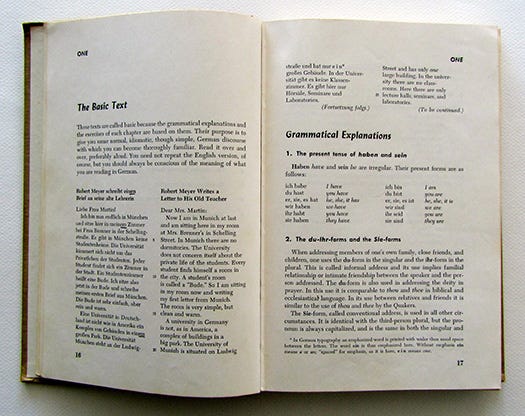
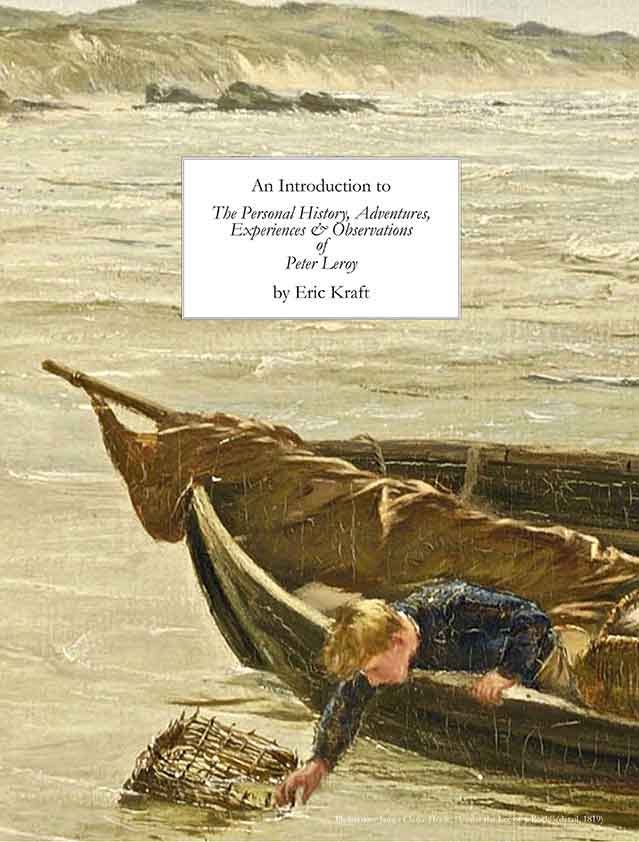
Observe that it is with his tears that man washes the afflictions of man, and that it is with his laughter that sometimes he soothes and charms his heart. . . .
To take one of the most commonplace examples in life, what is there so delightful in the sight of a man falling on the ice or in the street, or stumbling at the end of a pavement, that the countenance of his brother in Christ should contract in such an intemperate manner, and the muscles of his face should suddenly leap into life like a timepiece at midday or a clockwork toy? The poor devil has disfigured himself, at the very least; he may even have broken an essential member. Nevertheless the laugh has gone forth, sudden and irrepressible. It is certain that if you care to explore this situation, you will find a certain unconscious pride at the core of the laugher’s thought. That is the point of departure. “Look at me! I am not falling,” he seems to say. . . .
The man who trips would be the last to laugh at his own fall, unless he happened to be a philosopher, one who had acquired by habit a power of rapid self-division and thus of assisting as a disinterested spectator at the phenomena of his own ego. But such cases are rare.Charles Baudelaire, “On the Essence of Laughter”
“Later, when I remembered my dealings with Kraft, I thought with wonderment of his ability to give so much selfless attention to other people’s business at a time so critical for him and to explain so clearly and calmly things that didn’t concern him.”
Arkady Dolgoruky, in Fyodor Dostoevsky’s The Adolescent

He began by creating landscapes; then he created cities; then he created streets and cross streets, one by one, sculpting them out of the substance of his soul — street by street, neighborhood after neighborhood, out to the sea walls of the wharfs, where he then created the ports . . . street by street, and the people who walked them or gazed down at them from their windows . . . He began to know some of the people, at first just barely recognizing them, but then becoming familiar with their past lives and their conversations, and he dreamed all this as if it were mere scenery to delight the eyes . . . Then he traveled, with his memory, through the country he’d created . . . And thus he created his past . . . Soon he had another previous life . . . In this new homeland he already had a birthplace, places where he’d grown up, and ports from where he’d set sail . . . He began to acquire childhood playmates, and then friends and enemies from his youth . . . It was all different from what he’d actually lived. Neither the country, nor its people, nor even his own past were like the ones that had really existed . . .
Fernando Pessoa, The Mariner (translated by Richard Zenith)
The Babbington Press and all its publications are pieces of one fiction: The Personal History, Adventures, Experiences & Observations of Peter Leroy.
You can begin reading the Personal History at the beginning or you can catch up by visiting the archive or consulting the index to the Topical Guide.
You can listen to the episodes on the Personal History podcast. Begin at the beginning or scroll through the episodes to find what you’ve missed.
You can ensure that you never miss a future episode by getting a free subscription. (You can help support the work by choosing a paid subscription instead.)
At Apple Books you can download free eBooks of “My Mother Takes a Tumble,” “Do Clams Bite?,” “Life on the Bolotomy,” “The Static of the Spheres,” “The Fox and the Clam,” “The Girl with the White Fur Muff,” “Take the Long Way Home,” “Call Me Larry,” and “The Young Tars,” the nine novellas in Little Follies, and Little Follies itself, which will give you all the novellas in one handy package.
You’ll find overviews of the entire work in An Introduction to The Personal History, Adventures, Experiences & Observations of Peter Leroy (a pdf document) and at Encyclopedia.com.




